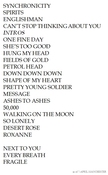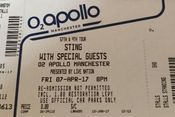
Sting review – ex Policeman gets back on the beat to deliver vintage pop show...
For a useful barometer of Sting’s career, look no further than his barnet. When the Police were in their chart-steamrollering early 80s pomp, their bass-playing frontman’s hair was blond and lustrous. In recent solo years, as his restless muse has careered alarmingly from musicals to carols to 16th-century songs accompanied on a lute – anything, in fact, other than the pop-rock-reggae that made him famous – his locks turned browner, shorter, greyer, relocated to his chin and eventually vanished altogether.
So it’s something of surprise to see that the thatch is back, standing almost vertically on his head. There seems to be some sort of bizarre Samson effect as he delivers a vintage pop show. Although Sting’s widely reported penchant for tantric sex turned out to be a drunken joke (“Tantric sex? For hours? With Sting? If only,” sighed his wife, Trudie Styler), this is a tantric setlist: a 22-song marathon stuffed with Police classics.
Sting is touring 57th and 9th, his first rock album in 13 years. It’s no Reggatta de Blanc, but it does see him return to his old band’s trusted tropes: arpeggiated guitars and pithily intelligent power-pop. The tracks Petrol Head, 50,000 (about mortality and the ridiculousness of rock stardom) and I Can’t Stop Thinking About You are given added live zip by a new young band, including his son, Joe. Fiery Tex-Mex support act the Last Bandoleros (with whom Sting guested earlier) join in with swaggering Rolling Stones-y backing vocals. The 65-year-old singer looks ludicrously fit, and has regained an octave, perhaps through yoga (or his eye-wateringly Strokes-tight trousers).
The former Policeman’s various phases must have challenged the keenest devotee’s ardour. This show, though, has something for everyone. There’s thumping rock (Synchronicity II, understated funk (Spirits in the Material World), call and response routines (“Yo, ho ho… ”), moody atmospherics (Fields of Gold) and politics. One Fine Day is cheekily dedicated to “Donald Trump’s environmental protection agency”; the gentle Fragile is rather movingly played for “the people of Syria … stop dropping bombs on them, for fuck’s sake”.
There aren’t any lute songs, but the Geordie former schoolteacher explains that Pretty Young Soldier is about “crossdressing among women in the 18th century … it’s a waltz”, before the party truly starts with a run of reworked Police smashes. Written in a Bayswater basement 38 years ago, accompanied by his cat (who “didn’t show any interest in my songs”), Message in a Bottle now has an extended dub section, interrupted by a yelled “I love you, Sting!” Walking on the Moon’s disoriented dub and heavy echo sounds similarly fantastic, before Roxannedetours into Bill Withers’ Ain’t No Sunshine and back into the killer chorus.
He may now be worth a reported £140m, but can still somehow summon up the required angst to deliver So Lonely and Next to You as hurtling new wave stompers. Every Breath You Take becomes a giant singalong, and people cheer the return of the Sting they’ve always wanted.
(c) The Guardian by Dave Simpson
No need to call The Police...
I first saw Sting perform live almost 40 years ago and (viewed from the balcony of the Manchester Apollo at least), nothing much has changed. The man is a testament to the preservative power of yoga. He stands fit, lean and poised centre stage, in much the same outfit of tight T-shirt and black straits he wore back when The Police stormed the bastions of punk to become new wave’s first pop superstars.
He may even have been playing the same battered white bass guitar, nimble fingers gliding across the fretboard, while his high, hoarse, expressive voice sailed above shards of sharp electric guitar and thunderous rock-reggae drums, leading the crowd in joyous call and response.
The squad of musicians may have changed but an opening salvo of Synchronicity and Spirits In The Material World demonstrated that Sting was ready and willing to lead a Police charge. In all, he played eight songs from his famous trio, including Message In A Bottle, Walking On The Moon, So Lonely, Roxanne, Next To You and Every Breath You Take, all delivered with a thrilling super-honed musical attack and swagger.
The actual Police completed a world blitzing reunion and farewell tour in 2008. Since then, Gordon Sumner CBE has toured with a symphony orchestra, embarked on singer-songwriter double bills with Paul Simon and Peter Gabriel, got out his lute for folk and jazz sets and starred in his own Broadway musical about ship building in Newcastle.
His latest album, 57th & 9th, marked a belated and arguably long overdue return to the lean, pop-rock style that fans first fell in love with, full of pithy, sharp, economical songs where the big issues are sugared with even bigger hooks. They fit hand in leather glove with his Police era classics and a swathe of his punchiest solo hits, including An Englishman in New York, Shape of My Heart, One Fine Day (he dedicated his environmental anthem to Donald Trump) and a tender, meditative version of Fragile (dedicated to the people of Syria: “Stop dropping bombs on them for f---’s sake”).
The original trio may have long since taken Police retirement but Sting’s new recruits are no slouches. Josh Freese is an explosive, wildly percussive drummer, every inch the equal of Stuart Copeland, while Dominic Miller is a dextrous player with a wide range of styles, even if it took the addition of his guitar playing son Rufus Miller to fully compensate for the more lateral, inventive dash of Andy Summers. It was a family affair, with Sting’s 40-year-old singer-songwriting son Joe Sumner joining on backing vocals, along with the four members of Tex-Mex support act The Last Bandeloros.
It was in this respect that the evening really differed from a Police drill. Sting’s former colleagues were an almost Gladiatorially combative group who kept each other and their audience on their toes with fierce, audacious, competitive displays of musicianship, like a jazz band playing rock. It was quite amazing to witness but didn’t always look like fun to be part of.
This, by contrast, was a relaxed and genial affair, with the band’s leader clearly encouraging a mood of care and camaraderie between musicians. As a result, the audience got the kinder, gentler face of the Policeman, more Sting of Dock Green than Line of Duty. No truncheons or riot shields required.
Personally, I missed that edge of tension but it left space for musical digression. Amidst the blizzard of rock smashes Sting’s repertoire expanded to the gorgeous, folky Fields of Gold, the sensuous Arabic groove of Desert Rose and (in case anyone feared he had mislaid his more pretentious side) a waltz about 18th century cross dressing soldiers with a concertina solo. At the heart of what Sting does is a supreme songwriting talent, flowing melodies, audacious grooves and meaningful lyrics delivered by a master musician who seems to get a genuine sense of accomplishment from performing at the highest possible level.
This show deserved a badge of honour. No need to call the Police.
(c) Daily Telegraph by Neil McCormick





